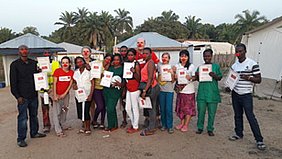RED NOSES International (RNI) is one of the leading hospital clown organisations in the world, with partner organisations in 10 countries. RNI has its HQ in Vienna, Austria, where the first RED NOSES (RN) organisation was founded in 1994. More than 350 specially trained RN hospital clowns reach more than 500.000 people, from babies to the elderly, every year in hospitals, elderly homes and similar institutions. The Emergency Smile programme, one of many RN programmes, entails sending a small team of specially selected clowns to crisis areas of the world, working with an established carrier organisation – like MSF. The costs of the missions are covered by RNI through grants and own funds.
For this mission, MSF Austria helped RNI to get in contact with MSF Spain (its Barcelona Office), who then decided that Sierra Leone would be the best place to conduct a mission together. The RNI team arrived in Freetown, the capital of Sierra Leone, on Saturday the 11th of November and the mission lasted until the team flew back to Europe on Sunday the 3rd of December 2017. The main target groups of the mission were children and mothers in the paediatric and maternity wards of an MSF Spain supported hospital, as well as a smaller health centre also supported by MSF, and the local staff of both facilities.
The RNI Emergency Smile team consisted of four clowns, one artistic leader and a mission leader. The main work took place in Kabala, in the Kabala Government Hospital (KGH) and in MSF’s facility in Mongo, the Mongo Community Health Centre (MCHC). Additional work was carried out in villages in the wider Mongo Chiefdom, where the team accompanied MSF on three outreaches. While in Sierra Leone, the RNI team was integrated into the MSF structures and daily routines. RNI has nothing but praise to the friendliness and professionalism of the MSF staff in Freetown, Kabala and Mongo!
The clowns bring laughter and life through their interactive and playful approach wherever they go. Always the first ones to laugh at, or mock, their own silliness and clumsiness, the clowns bring a unique lightness to everyone. The RNI team also made special humour workshops next to the traditional clowning in the various medical wards, and a special show that had been prepared before the mission. The humour workshops targeted the local staff of the KGH and the MCHC, as well as MSF staff in both places. The humour workshops represent the desire of RNI to bring something sustainable to the Emergency Smile missions. Through these workshops the idea and philosophy of RNI are left behind when the mission is over.
The main aim of the workshops is to give tools and training to achieve lower stress conditions for the staff and their patients, as well as provide concrete tools and small tricks to decrease fear for little patients and their parents. Lower stress levels and less fear raise the quality of the daily work and make treatments and the healing process faster and better. Furthermore, it can strengthen the often fragile trust between colleagues and between staff and, more often than not, mistrustful patients. This more relaxed atmosphere improves the quality of the treatments and the emotional situation in general among the staff. The clowns observed after the first workshop in Kabala that many nurses where applying these tools with great effect!
With specific silly games, the participants dive into the world of children and can rediscover their own power of fantasy and experience the ‘pleasure of failing’. In their often highly stressing and responsible medical activities, mistakes are most often forbidden to make. In RNI we call this aspect of failing ‘discovering one’s own humour’, and it simply means to play and to enjoy the childish stupidity and vulnerability inherent in us all in a safe and playful environment.
Overall the mission was a great success. It was hard work and very exciting for the RNI team to experience the beauty of Sierra Leone and the friendliness of its people. At the same time it was extremely rewarding to see how positively the work was received, by both patients and staff. RNI hopes to continue working with MSF in the future. In 2018 new missions are planned with the International Federation of the Red Cross, and RNI will also explore possibilities for cooperation with other partners.

